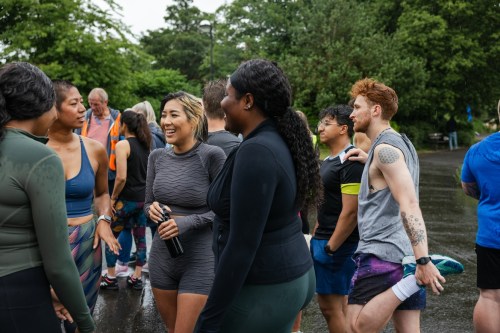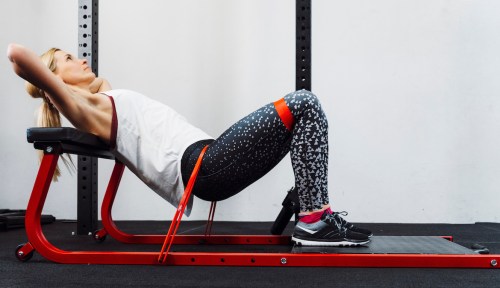Living in the thick of the digital age, it’s easy to assume that dating apps are the only way to find a romantic partner… that is, until run clubs began to spike in popularity. According to Strava’s 2023 Year in Sport Trend Report, the number one reason that their users exercise with others is to foster a social connection, and in particular, Gen Z users of the activity-driven app were responsible for an 11 percent increase in new community clubs last year.
Experts in This Article
co-founder of Cooldown Run Club in Denver
therapist and chief clinical officer at premarital counseling platform Ours
co-founder of Cooldown Run Club in Denver
At their core, run clubs are for hitting a certain mileage, improving pace, and setting aside time for intentional activity on a weekly basis. But the sense of community they foster began to draw more members who were seeking a connection—one that went far beyond running itself. And the clubs have started to catch on.
Cooldown, a run club with roots in Denver that has expanded to 10 major U.S. cities, positions itself as a “social club disguised as a run club” and frequently shares videos on its social channels about turning to a run club if dating apps are no longer working for you.
Single runners have also taken to TikTok to spread the word about this in-person alternative to dating apps: The search query “run club dating” returns hundreds of video results with hundreds of thousands of views—and comments that nod to the preference of meeting a partner within an active community.
Are run clubs really a reliable option for singles feeling defeated by dating apps? Ahead, a love expert and run club founders weigh in on what a turn to local community could mean for modern dating.
Dating apps aren’t doing it anymore
Single folks are not as pleased with dating apps as they once were, especially for younger dating pools. In a recent study from Savanta, over 90 percent of the Gen Z participants who were polled reported frustration with dating apps.
“People are tired,” says Benu Lahiry, LMFT, chief clinical officer at Ours. “People are definitely tired of the same types of questions, of answering the same things online, particularly when they’ve done it for a long period of time and haven’t seen the fruits of the effort that goes into the process.”
According to Pew Research, 44 percent of dating app users say that the major reason they use these services is because they want to meet a long-term partner. When their desires aren’t being fulfilled time and time again, it can feel quite disheartening. Virtual interactions prior to meeting for a first date can feel positive, but it’s difficult to fully understand who someone is when you’re only presented with a few prompts, photos, and a brief text exchange—dating apps only represent a part of someone’s personality, not the fullest extent.
The letdown of not feeling the same connection IRL that you had via app is disillusioning, according to Lahiry.
What was once a novel experience has turned sour for many singles. Sure, it might have been fun to scroll through profiles and swipe right based on career, height, and quick wit to a pre-programmed question—but when even the most “perfect” curation of matches doesn’t translate into a serious romantic partner, the fun is lost over time.
Why run clubs for dating makes sense
Where dating apps are lacking when it comes to understanding the full personality of a potential suitor, run clubs are making up for it with a community-driven approach. And although the main purpose of run clubs isn’t to act as a match-making service, this could actually be a positive for single runners looking for love.
“You could be running next to someone and ask how their day was without necessarily flirting with them,” says Bailey Ness, the co-founder of Cooldown, on some of the conversations she’s witnessed at the club’s weekly meetups. “But all of the sudden you’re having a great conversation that leads to seeing them every single week and maybe leads into a relationship one day as well.”
By opening a space for people to converse and connect, run clubs create an un-intimidating environment to experiment with flirting that doesn’t feel as direct or daunting. A conversation might start out as a friendly chat and lead to something more down the road.
Cooldown in particular might feel more approachable for singles who haven’t laced up in awhile—the club focuses more on fostering space for its members to socialize than to reach a new PR. “At Cooldown you can run at whatever pace you want, even if that means walking,” explains co-founder Daniel Belk.
Lots of run clubs have this any-pace-welcome approach—meaning your mile time doesn’t need to be a stat that you wear on your sleeve to give a new method of dating a try.
There’s also a scientific reason run clubs could be the answer to finding a partner: your body is primed to be a good mood when you run. According to the Cleveland Clinic, your body releases endorphins, hormones that relieve pain, reduce stress, and improve your sense of well-being, during exercise. And what’s more, running is also a great way to increase levels of endocannabinoids, which can reduce anxiety and make you feel calmer, according to Johns Hopkins Medicine.
With the help of endorphins and endocannabinoids, you’re “naturally in a more confident place to connect with someone,” says Lahiry.
Shifting your dating perspective
According to Ness and Belk, run clubs create a neutral place for singles to meet other people (in the flesh!), some of whom might be seeking a romantic relationship, and with much less weight than can come with dating apps. Instead of feeling like a date “failed” because your prospective partner didn’t match their dating profile, you can simply position yourself in a situation where you’re bound to meet people in real life.
And running clubs have more benefits than finding someone to date: they open a space to create conversation, be active, meet new people. Maybe a relationship will come out of the experience, but if not, you’re still tracking at a net positive.
The ultimate goal of matching with someone on a dating app is to move the conversation offline—you have to meet someone face-to-face to ultimately see if a connection exists, says Lahiry.
“At a run club, you can show up as yourself and exist in a space that accepts that,” she says.
If swiping has left you dissatisfied, it might be worth pushing yourself to connect with others in your community—whether a relationship is promised at the end of the finish line or not. And if that community is a run club, your mental and physical health will thank you.
Sign Up for Our Daily Newsletter
Get all the latest in wellness, trends, food, fitness, beauty, and more delivered right to your inbox.
Got it, you've been added to our email list.











